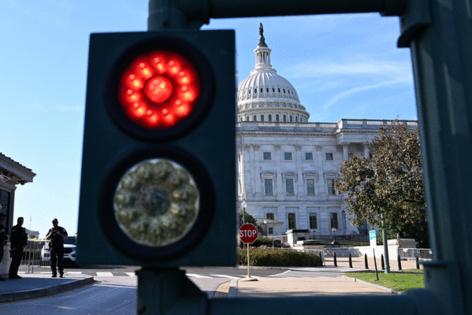This week: Senate to weigh in on tariffs, shutdown pay for air traffic controllers
Published in Political News
WASHINGTON — President Donald Trump is in Asia this week, while back in Washington the partial government shutdown shows no sign of ending.
The Senate this week is expected to take up three joint resolutions that would terminate emergency declarations by the president that have been used to impose tariffs. That’s in addition to judicial nominations and any more potential votes related to reopening the government. The House, once again, is not in session.
Treasury Secretary Scott Bessent said Sunday on CBS’s “Face the Nation” that he expects to run out of funds available to pay military service members starting Nov. 15.
A bill to provide for troop pay is among the menu of options for Senate votes in the coming weeks.
“It’s a global embarrassment what these Democratic senators are doing, keeping the government shut down,” Bessent said. “It’s starting to affect the economy, it’s starting to slow down air traffic, and I would urge moderate Democrats to be heroes, come across the aisle like they did in the spring and pass a clean CR.”
Federal Aviation Administration staffing shortages were causing issues with flight schedules across the country, including a Sunday ground stoppage in Los Angeles.
One of the bills that Senate Republicans could try to call up this week is a measure from Commerce, Science and Transportation Chairman Ted Cruz, R-Texas, to provide pay to air traffic controllers and Transportation Security Administration personnel.
Transportation Secretary Sean Duffy, at a news conference Thursday with House Republican leaders, sought to reinforce the message of the cost of the shutdown on aviation workers.
He said the air traffic controllers will miss their first check on Tuesday.
After last week’s unsuccessful attempt to advance legislation designed to pay federal workers during the lapse in appropriations, senators from both parties said their staff would be looking to consolidate Republican and Democratic proposals. The Republican offering, led by Sen. Ron Johnson of Wisconsin, had focused on excepted personnel who have continued to work even if not getting paid. Sen. Chris Van Hollen of Maryland and other Democrats want to make sure furloughed workers receive back pay, as well.
While there could be bipartisan movement on the effort to pay federal employees, Democratic messaging on the continuing resolution itself has not moved much.
“The government is shut down because Republicans have done something unprecedented. They have refused to talk to Democrats about a bipartisan budget,” Sen. Christopher S. Murphy, D-Conn., said Sunday on CNN’s “State of the Union.” “Yes, we have priorities, just like they do. One of our priorities is pretty simple — making sure that premiums don’t go up by 75% on 22 million families this fall.”
Murphy was referring to the pending expiration of expanded tax credits that help people purchase health insurance plans through the exchanges set up in the 2010 health care law.
Just securing a vote on extending subsidies isn’t enough, Murphy said, since it “doesn’t help anybody in my state because all these Republicans are going to vote against it.”
Also on the long list of potential shutdown-related items for the floor is a bill from Sen. Josh Hawley, R-Mo., that would fund Supplemental Nutrition Assistance Program benefits, otherwise known as food stamps. Hawley has said he intends to ask for unanimous consent to either pass the measure or to get a vote scheduled. The Department of Agriculture said last week that it would not be able to use a special reserve fund to pay food stamp benefits during the current shutdown.
More tariff votes
The immediate legislative business for the Senate is the disapproval measures related to tariffs.
No later than Friday, the Senate will debate and vote on measures that would terminate national emergency declarations that Trump has used to impose duties on Brazilian and Canadian imports, as well as global tariffs more broadly.
Trump said last week that his administration would be stopping trade negotiations with Canada, and he told reporters traveling with him en route to Tokyo on Monday that he did not intend to meet with Canadian Prime Minister Mark Carney during the trip to Asia. “I’m not going to be meeting with him for a long time,” he said.
“The madness must stop,” Senate Minority Leader Charles E. Schumer, D-N.Y., said last week in previewing this week’s floor votes. “Senate Democrats will force votes to reverse Donald Trump’s damaging tariffs on Canada and other countries that have been one of the driving forces behind higher prices. Americans will see if Republicans put Donald Trump or average families first.”
_____
(Valerie Yurk and Olivia M. Bridges contributed to this report.)
©2025 CQ-Roll Call, Inc., All Rights Reserved. Visit cqrollcall.com. Distributed by Tribune Content Agency, LLC.
























































Comments